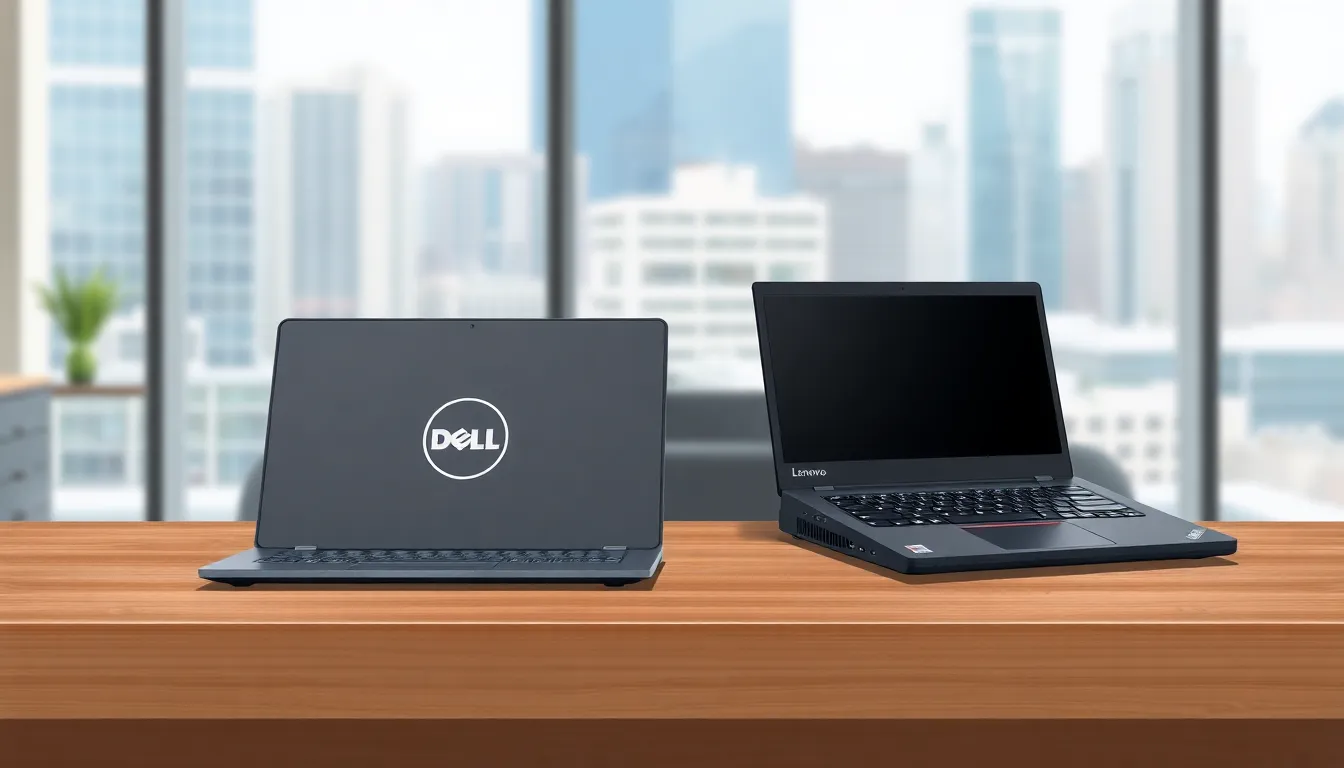Table of Contents
ToggleWhen it comes to choosing a laptop, the battle between Dell and Lenovo is like deciding between pizza and tacos—both are delicious, but each has its loyal fans. With a plethora of options on the market, it can feel like a techie version of “Survivor.” Which brand will reign supreme in performance, design, and value?
Overview of Dell Vs Lenovo Laptops
Dell laptops deliver a strong mix of performance and design. They offer a variety of models, catering to gamers, professionals, and everyday users. Some popular series include XPS for premium users and Inspiron for general use. Notable features often include high-resolution displays and powerful processors.
Lenovo laptops emphasize versatility and innovation. Their ThinkPad series is renowned for its durability and excellent keyboard design, making it a favorite among business professionals. The Yoga line provides flexibility with its 2-in-1 designs that support multiple usage modes.
Both brands present a range of price points, accommodating budget-conscious buyers while providing premium options. Dell often positions its models with sleek aesthetics and high-end specifications, while Lenovo focuses on practical features and reliability.
Customers frequently consider user experience as a deciding factor. Dell’s customer support receives positive reviews, which enhances brand loyalty. Lenovo users appreciate the robust build quality and long-lasting battery life, making it an excellent choice for on-the-go professionals.
When comparing specifications, Dell typically features faster processors and vibrant displays, ideal for tasks requiring high resolution and color accuracy. Meanwhile, Lenovo offers longer battery life and solid performance, suitable for extended use without needing a charge.
Choosing between Dell and Lenovo involves evaluating specific needs, such as preferred design, intended usage, and budget. Many individuals find satisfaction with either brand, as both continually innovate and improve their product offerings. Each excels in different areas, making it essential to understand personal requirements before making a decision.
Performance Comparison

Performance varies significantly between Dell and Lenovo laptops, influenced by their distinct design philosophies and component choices. Evaluating processor options and memory configurations can help determine the best fit for individual needs.
Processor Options
Dell offers a broad range of processors, including Intel’s latest Core series and high-performance AMD Ryzen chips. Users can select configurations tailored for gaming, content creation, or business tasks. Lenovo, on the other hand, integrates similarly powerful processors in its models, particularly within the ThinkPad and Yoga series. Performance benchmarks reveal that Dell typically excels in multi-core performance, while Lenovo maintains competitive single-thread speeds. Both brands ensure seamless operation for demanding applications, but users should consider specific models based on their computing requirements.
RAM and Storage
Both Dell and Lenovo prioritize RAM and storage options to enhance user experience. Dell frequently includes configurations that accommodate up to 64 GB of RAM, essential for multitasking and intensive applications. In contrast, Lenovo’s ThinkPad series often offers customizable RAM options tailored for professional environments. Storage choices across both brands include speedy SSDs and larger HDDs, with Dell leaning towards NVMe SSDs for superior read/write speeds. Lenovo provides similar options, emphasizing reliability through its build quality. Ultimately, users benefit from choosing the right balance of RAM and storage to suit their specific usage patterns.
Design and Build Quality
Both Dell and Lenovo laptops prioritize design and build quality, catering to different user needs and preferences.
Aesthetics and Ergonomics
Dell laptops often feature modern, sleek designs with metal finishes, appealing to users seeking a premium look. The XPS series exemplifies this with its thin profile and minimal bezel, creating an immersive visual experience. Lenovo’s ThinkPad laptops sport a more utilitarian design, focusing on functionality. The keyboard layout on ThinkPads is widely praised for its comfort, making them ideal for long typing sessions. Users appreciate that both brands offer a variety of colors and styles, allowing individuals to choose models that fit their unique tastes.
Durability and Materials
Dell emphasizes sturdy build quality, utilizing high-quality materials in its premium models. XPS laptops incorporate aluminum chassis and Gorilla Glass for added protection. Lenovo focuses on durability as well, particularly in its ThinkPad series, which undergoes rigorous testing for military-grade specifications. The use of magnesium alloy and carbon fiber enhances the structural integrity of these laptops. Users benefit from this attention to durability, as both brands perform well under daily wear and tear. Additionally, both brands provide good warranties, ensuring that customers feel secure in their investments.
Price Range and Value
Both Dell and Lenovo offer diverse pricing strategies appealing to different market segments. They provide options for budget-conscious consumers while also catering to demanding users willing to invest in premium devices.
Entry-Level Models
Dell’s entry-level laptops, such as the Inspiron series, start around $400, appealing to students and casual users. Lenovo’s Ideapad series offers similar pricing, often providing additional features at competitive rates. Both brands prioritize value in these models, ensuring essential performance for everyday tasks like web browsing and document editing. Users often note the excellent build quality despite the lower price tags. Each entry-level option comes equipped with adequate processors and decent RAM, fulfilling common needs efficiently without overwhelming costs.
Premium Offerings
Dell’s XPS series stands out in the premium market, with prices typically ranging from $1,200 to $2,500. These laptops emphasize high-end displays and top-tier processors. Lenovo’s ThinkPad X1 Carbon, priced between $1,500 and $2,300, remains a favored choice among professionals for its durability and exceptional keyboard layout. Both premium offerings showcase cutting-edge technology with robust designs. Customers frequently appreciate the longevity and performance these models provide, making them worthwhile investments for advanced users. Each brand competes closely in this segment, ensuring users receive significant value for their elevated price points.
Customer Support and Warranty
Both Dell and Lenovo focus on providing reliable customer support and warranty services. They design their support systems to assist users effectively, ensuring prompt resolutions to issues.
Service Options
Dell offers a variety of service options, including on-site support, phone assistance, and online chat. Users can purchase extended warranties and accidental damage coverage, enhancing peace of mind for laptop owners. Lenovo presents similar options, featuring comprehensive online resources and support forums, in addition to warranty extensions. Their ProSupport service grants access to advanced technical support, catering to businesses with critical needs. Customers benefit from diverse service plans, allowing them to choose the level of support that aligns with their requirements.
User Reviews
User reviews indicate that Dell excels in responsiveness and thoroughness in customer support experiences. Many users appreciate the efficiency of their repairs and troubleshooting. Lenovo users frequently highlight the reliability of their devices, with less frequent need for support interventions. Positive feedback often centers on the durability and performance of Lenovo laptops, contributing to overall satisfaction. These insights suggest that both brands maintain strong reputations, yet Dell may have a slight edge in immediate customer service results.
Choosing between Dell and Lenovo laptops ultimately hinges on individual needs and preferences. Dell shines with its performance and sleek designs, making it an excellent choice for users who prioritize aesthetics and high-end specifications. On the other hand, Lenovo stands out for its durability and practicality, particularly appealing to business professionals and those seeking versatile designs.
Both brands offer solid options across various price points, ensuring that budget-conscious buyers can find a suitable device. With a focus on customer satisfaction, Dell and Lenovo provide reliable support and robust build quality. Ultimately, whether one prefers Dell’s modern flair or Lenovo’s dependable functionality, both brands continue to deliver exceptional laptops tailored to diverse user requirements.







